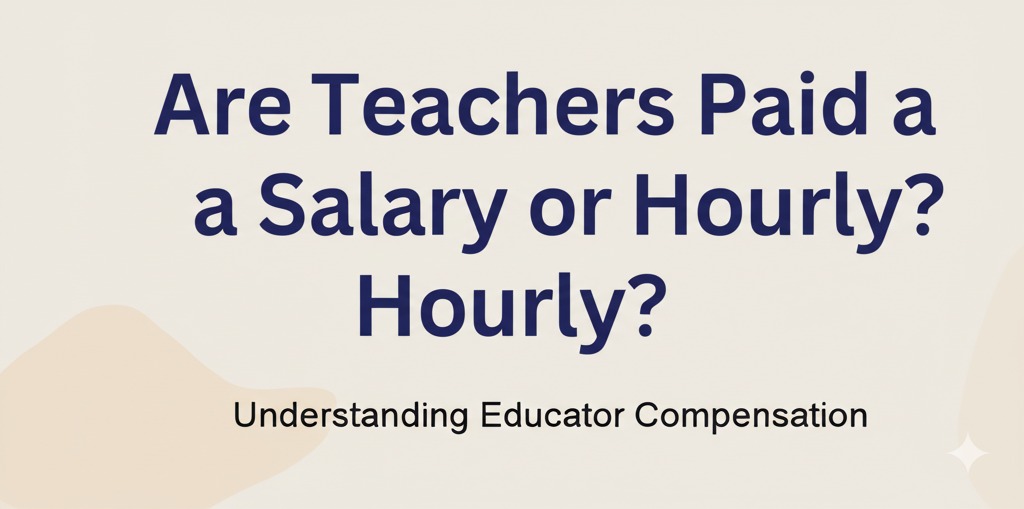
Introduction
Teachers play a crucial role in shaping the future by educating and mentoring students. However, when it comes to their compensation, there is often confusion about whether teachers are paid a salary or hourly wage. Understanding how teachers are compensated is important for educators, policymakers, and anyone considering a career in teaching. In this article, we’ll break down how teachers are paid, explore the factors that influence their earnings, and compare their compensation structure to other professions.
Are Teachers Salaried or Hourly Workers?
The Standard Compensation Model
In most cases, teachers are salaried employees. This means they receive a fixed annual income that is divided into regular paychecks throughout the year. Their pay is not directly tied to the number of hours worked, as is the case with hourly employees. Instead, their salary is determined by factors such as experience, education level, and location.
Exceptions: When Teachers May Be Paid Hourly
While the majority of full-time teachers receive a salary, there are some exceptions:
- Substitute teachers – Often paid on a daily or hourly basis.
- Adjunct instructors and part-time teachers – May receive hourly wages instead of an annual salary.
- Tutors and private educators – Typically charge by the hour.
Factors That Influence Teacher Salaries
1. Education and Certifications
Teachers with higher degrees, such as a Master’s or Doctorate in Education, often earn higher salaries. Many school districts offer pay incentives for additional qualifications and professional development.
2. Years of Experience
Salary increases are common as teachers gain more experience. Most school districts use a step-based pay scale, where salaries rise incrementally with each year of service.
3. Geographic Location
Where a teacher works significantly impacts their pay. Teachers in urban areas or states with higher costs of living tend to earn more than those in rural regions. For example, teachers in California and New York often have higher salaries compared to those in the Midwest.
4. Public vs. Private Schools
Public school teachers typically earn more than private school teachers, as public schools receive government funding. However, private schools may offer other benefits, such as smaller class sizes and specialized curricula.
5. Union Membership
Many teachers belong to teachers’ unions, such as the National Education Association (NEA) or the American Federation of Teachers (AFT), which negotiate better pay and benefits.
How Do Teachers’ Salaries Compare to Hourly Wages?
Although teachers receive a set salary, it’s important to consider how many hours they actually work. The perception that teachers work only during school hours or have summers off is misleading. A teacher’s workweek often includes:
- Classroom instruction (typically 35-40 hours per week)
- Lesson planning and grading (an additional 10-20 hours per week)
- Professional development and meetings
- Extracurricular activities and student support
When broken down into an hourly wage, many teachers earn less per hour than professionals in other fields with similar education levels.
The Myth of Summer Break Pay
A common misconception is that teachers are paid for doing nothing during summer break. In reality, teachers’ salaries are often spread out over 12 months, even though they typically work around 9-10 months per year. Some educators take on summer jobs, tutoring, or professional development courses to supplement their income.
Conclusion
While most teachers are salaried employees, there are exceptions where hourly pay applies. Their salary is influenced by multiple factors, including experience, education, location, and union membership. Despite working long hours beyond the classroom, their effective hourly wage often falls below that of other professionals with similar qualifications.
For those considering a teaching career, understanding the pay structure is crucial. If you’re passionate about education and want to make a difference, the rewards of teaching extend beyond just the paycheck.
Thinking of becoming a teacher? Research salary trends in your area and explore opportunities for professional development to maximize your earning potential.

Andre Cuevas provides career insights, job search strategies, and professional advice to help individuals navigate the job market and achieve their career goals.





